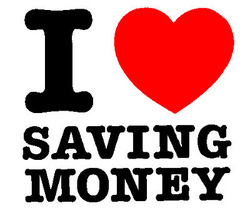Believe it or not, economizing not that hard to do and it doesn't necessarily mean you have to live a spartan life and be miserable because you are doing "without". Simply changing habits, re-prioritizing and learning to be a wise consumer will make a big difference in your budget. Yet, you can still be happy.
It's pretty obvious that we have become very used to convenience and getting things "fast". People are very busy, time is "limited" and we try to pack as much as possible into our day. We have also been subjects of very clever marketing and advertising strategies that are based on science and human behavior research that takes advantage of our habits and facilitates decisions we make. (This was a topic of an earlier Musing - Power of Habit.) Generational changes have also created a mindset of "I deserve it ", "I'm worth it." and "I want it now.". (That topic was discussed in an earlier Musing - Generation Me.) Consumers also tend to very wasteful. We discard functional items just because we want the newest, latest and greatest. We have a tendency to overbuy, impulse buy, and practice daily living habits that lead to waste. (ie. An easy way to save water and money is the subject of an earlier Musing)
Living On a Dime website (link appears below) offers great ideas in a variety of areas that you can choose from and incorporate into your lifestyle. Some of their ideas are very easy, and some require more effort and commitment. What works for you may not work for someone else.
Food and groceries consume a large part of our budget. Learning to economize in this area can make a significant impact on your budget and life! Here are some ideas from Living on a Dime that I have found make a difference for us.
1. Control trips you make to the store.
I found this habit change was very significant. Naturally, by doing this, you will be saving money on gas AND you will be saving your TIME, which is valuable too! Just being present in a store increases the likelihood you will make purchases, and most importantly, make unplanned purchases. Limit your trips by planning, and grocery shopping less often. A great idea is to eliminate going for one week (and if you must go to get bread or milk, STICK to your list, grab those couple of items and leave before you end up loading your cart with unplanned purchases). Make an effort to plan meals with what you already have in your pantry vs. running out to get what you need. I try to have a pantry/freezer day at least once a week, using only what I already have on hand. You can be creative! You will use your food pantry items that might end up being forgotten about and ultimately being tossed in the trash. Our family even practices a tradition we call "backwards day". Eating together as a family for a traditional breakfast is a rare occasion for us. Every so often, I will have "backwards day" and serve breakfast for dinner! This helps me to use things from the freezer (sausages, bacon) and pantry (ingredients for pancakes, waffles or french toast) and even eggs (I don't know about you, but I sometimes end up with an overabundance of eggs that I bought on sale).
2. Be flexible and learn to substitute.
Find out that you don't have what you "need" to make a meal? Sometimes it is tempting to just run out and pick up the missing item from the store. (see #1). Often you can simply substitute an item to make things work! Yesterday, we had pulled pork for dinner and I had planned to use hamburger buns (in my case, homemade) to make sandwiches. However, I had a "failure" and my buns didn't turn out as planned. Did I run out to pick up buns? Nope! We went to Plan B. I had flour tortillas in the fridge, so we simply had pulled pork wraps vs. pulled pork on a bun. This substitution worked out just fine and I saved a trip to the store.
3. Shop sales, take advantage of coupons and try generic brands.
This idea has been around a long time. One excuse for not using coupons is "I don't have time". Things have changed and many stores are promoting the convenient use of e-coupons. You have savings available straight from your smart phone! Don't forget to visit websites of favorite products. They often have printable coupons available! Store sales fliers are now on line too. Many times, generic brands can be substituted for brand names. Give them a try and find out which ones you and your family likes. There can be significant savings by simply switching to generics.
4. If shopping warehouse stores-exercise good judgement.
Warehouse stores are very popular avenues to "save money". They really do offer great prices, but not on everything. Sometimes, when using coupons and sales, you can actually get items cheaper at your local store. Warehouse stores have packaging that requires you to buy in bulk/large quantity. One great idea is to split your bulk purchases with others. You will share in the savings and end up not throwing away money OR product! If you can't use that amount of product in a reasonable time, you may not be saving money at all. In addition, the ever changing inventory in warehouse stores also encourages shoppers to "browse" to see what's new. Fun to do, but dangerous as you will most likely come home with unplanned, impulse purchases! Make sure you shop with a list, don't be tempted to overbuy in large quantity, which may result in waste and be sure to put some thought into that impulse buy item you have put in your cart. Evaluate whether you really need the item, or is it simply the "great bargain" that's driving your purchase.
Pennsylvania State University has a great document about economizing and cutting corners. (link appears below). It has over 100 GREAT ideas you may want to take advantage of depending on your circumstances and personal situation. Here is a synopsis of their general strategies.
1. Substitute
Substitute less costly for more costly resources. Develop a habit of thinking "What can be substituted that would do the job for less money?"
2. Conserve
Avoid waste. Develop a habit of thinking "How can we make all items last? How can we use it more efficiently?" (example- see my Musing about Saving Water and Money)
3. Utilize
Find new uses for resources your already have. Develop a habit of thinking "What are the talents, time or other resources we have that could be put to new, more productive use?"
4. Cooperate
Resources can be multiplied when you cooperate with others. Think: "How could I or other family members share time or talent with others to stretch our resources?"
5. Find Free Community Resources
Personal or family resources can be greatly enhanced through use of community resources. Think" "How can we use and support public services for family welfare, education, health and recreation?" (easy examples include: using your public library, community parks and recreation programs, and visiting free concerts and fairs.)
http://www.livingonadime.com/saving-on-groceries-make-do/
http://osceola.ifas.ufl.edu/pdfs/FCS_HF/cuttingcosts.pdf


 RSS Feed
RSS Feed
